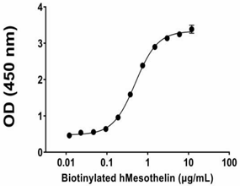- Regulatory Status
- RUO
- Other Names
- Antigen recognized by antigen K1 (CAK1, CAK1 antigen), megakaryocyte potentiating factor (MPF), soluble MPF, mesothelinreleated protein
- Ave. Rating
- Submit a Review
- Product Citations
- publications

-

Biotinylated recombinant human Mesothelin binds to immobilized CA125/MUC16 in a dose-dependent manner using a functional ELISA. The ED50 for this effect is 0.27 – 1.35 µg/mL. -

Stability Testing for Biotinylated Recombinant Human Mesothelin. Biotinylated recombinant human Mesothelin was aliquoted in PBS, pH 7.2 at 0.2 mg/mL and one aliquot was kept at 4°C (Control), and another was frozen and thawed four times (4x Freeze/Thaw). The samples were tested by their property to bind to immobilized CA125/MUC16 in a dose-dependent manner using a functional ELISA. The ED50 for this effect is 0.27 – 1.35 µg/mL.
| Cat # | Size | Price | Quantity Check Availability | Save | ||
|---|---|---|---|---|---|---|
| 568404 | 25 µg | $215 | ||||
| 568406 | 100 µg | $695 | ||||
Mesothelin (MSLN) was initially cloned from a library of human pancreatic cancer cells. It was also identified by a monoclonal antibody, MAb K1, which recognized a glycoprotein present on the surface of mesothelial cells. The human MSLN gene encodes a ~71 kD precursor protein of 622 amino acids. The C-terminal glycosylphosphatidylinositol (GPI) anchor addition signal is removed (cleavage site: Ser598) and the latter replaced with a GPI anchor. The MSLN precursor is cleaved by furin at Arg295 into two products, a ~31 kD mature megakaryocyte potentiating factor (MPF residues Ser34 - Arg286) and a ~40 kD GPI-anchored membrane-bound mature mesothelin starting from Glu296. The 40 kD GPI-anchored mesothelin can be released by treatment with phosphatidylinositol-specific phospholipase C. Soluble mesothelin specifically binds to ovarian carcinoma cell line OVCAR-3, mediated by the cancer antigen 125 (CA125), a mucin-like glycoprotein on the surface of tumor cells. CA125 and mesothelin are co-expressed in advanced grade ovarian adenocarcinoma, and it has been speculated that CA125 might contribute to the metastasis of ovarian cancer to the peritoneum by initiating cell attachment to the mesothelial epithelium via binding to mesothelin. In addition, mesothelin and CA125/mucin 16 (CA125/MUC16) are co-overexpressed at the invading edges of pancreatic cancer tissues, and their expression correlates with poor survival rates. Mesothelin is highly expressed in several human cancers including malignant mesothelioma, pancreatic, ovarian, cholangiocarcinoma, and lung adenocarcinoma.
Product DetailsProduct Details
- Source
- Biotinylated Recombinant Human Mesothelin, amino acid sequence (Glu296-Thr600) (Accession: # AAH09272.1), was expressed in 293E cells. The carboxy-terminus contains 6His-Avi tag. Human Mesothelin-Avi tag was site-specifically biotinylated by enzyme BirA.
- Molecular Mass
- The 341 amino acid recombinant protein has a predicted molecular mass of approximately 37.8 kD. The DTT-reduced and non-reduced proteins migrate at approximately 40 kD - 50 kD by SDS-PAGE. The predicted N-terminal amino acid is Glu.
- Purity
- > 95%, as determined by Coomassie stained SDS-PAGE.
- Formulation
- 0.22 µm filtered protein solution is in PBS, pH 7.2
- Endotoxin Level
- Less than 0.1 EU per µg cytokine as determined by the LAL method.
- Concentration
- 25 µg size is bottled at 200 µg/mL. 100 µg size and larger sizes are lot-specific and bottled at the concentration indicated on the vial. To obtain lot-specific concentration and expiration, please enter the lot number in our Certificate of Analysis online tool.
- Storage & Handling
- Unopened vial can be stored between 2°C and 8°C for up to 2 weeks, at -20°C for up to six months, or at -70°C or colder until the expiration date. For maximum results, quick spin the vial prior to opening. The protein can be aliquoted and stored at -20°C or colder. Stock solutions can also be prepared at 50 - 100 µg/mL in appropriate sterile buffer, carrier protein such as 0.2 - 1% BSA or HSA can be added when preparing the stock solution. Aliquots can be stored between 2°C and 8°C for up to one week and stored at -20°C or colder for up to 3 months. Avoid repeated freeze/thaw cycles.
- Activity
- Biotinylated recombinant human Mesothelin binds to immobilized CA125/MUC16 in a dose-dependent manner using a functional ELISA. The ED50 for this effect is 0.27 – 1.35 µg/mL.
- Application
-
Bioassay
- Application Notes
-
BioLegend carrier-free recombinant proteins provided in liquid format are shipped on blue ice. Our comparison testing data indicates that when handled and stored as recommended, the liquid format has equal or better stability and shelf-life compared to commercially available lyophilized proteins after reconstitution. Our liquid proteins are validated in-house to maintain activity after shipping on blue ice and are backed by our 100% satisfaction guarantee. If you have any concerns, contact us at tech@biolegend.com.
Antigen Details
- Structure
- Monomer
- Distribution
-
Tumor cells, mesothelial cells lining the pleura, peritoneum, and pericardium
- Function
- Cell adhesion. It may promote cancer cell survival, proliferation, and metastasis. It confers resistance to cytotoxic drug-induced apoptosis.
- Interaction
- Cancer cells
- Ligand/Receptor
- CA125/MUC16
- Bioactivity
- Biotinylated recombinant human Mesothelin binds to CA125/MUC16
- Cell Type
- Endothelial cells, Macrophages, NK cells, T cells
- Biology Area
- Cancer Biomarkers, Cell Adhesion
- Molecular Family
- Adhesion Molecules
- Antigen References
-
- Kojima T, et al. 1995. J Biol Chem. 270:21984-90.
- Chang K and Pastan I. 1996. Proc Natl Acad Sci. USA. 93:136.
- Rump A, et al. 2004. J Biol Chem. 279:9190-8.
- Bharadwaj U, et al. 2011. Mol Cancer. 10:106.
- Chen SH, et al. 2013. Sci. Rep. 3:1870.
- Tang Z, et al. 2013. Anticancer Agents Med Chem. 13:276-80.
- Gene ID
- 10232 View all products for this Gene ID
- UniProt
- View information about Mesothelin on UniProt.org

 Login/Register
Login/Register 















Follow Us